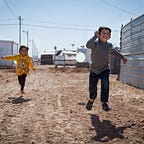Meet our Advocates
This year, Refugee Pathways is highlighting its team members through our “Meet our Advocates” series, which includes publishing various engaging Q&As with our staff. Enjoy!
Q&A with Emily
Emily Ervin is a graduate student at Columbia University’s Teachers College in the International Educational Development program and is based in New York City. At Refugee Pathways, Emily focuses on blog writing and outreach. She is passionate about supporting opportunities for refugees to live safe, fulfilled lives with continued access to quality education in times of crisis. Emily connected with Julie during their time in an International Service undergraduate program at American University based in Washington D.C. Here’s more about her.
Q: What caused your initial interest in working to support refugees?
While working at the Institute for International Education, I administered higher education scholarship opportunities for international students planning to study in the United States. I had a chance to learn more about scholarship opportunities specifically for refugees and displaced students and scholars who want to continue their education during times of immense uncertainty. Hearing their stories, desire to learn more about the world around them, and their hope to rebuild their lives and communities that have been disrupted from crises has shifted the impact that I want to have in my profession. Education can be life-changing, and seeing it change the lives of refugee students while also granting opportunities for fulfillment and purpose is the best reward.
Q: Why are you working specifically with Refugee Pathways?
With formal resettlement numbers low in many countries, complementary pathways such as academic scholarships, family reunification, humanitarian visas, and community sponsorship are necessary to protect refugees. However, the information about these opportunities is often hard-to-reach and inaccessible for refugees. Refugee Pathways simply provides information about these complementary pathways on one platform, which is a valuable opportunity to connect refugees with pathways to safety. Knowing that being a part of Refugee Pathways advances this goal of expanding access to lifesaving opportunities is one of the reasons I enjoy being a part of the RP team so much.
Q: What is your favorite right?
It’s hard to choose a favorite right! However, most of my work is dedicated to protecting the right to education. I think of education as an enabling right. With education, an individual can acquire the necessary skills, knowledge, and confidence to secure other rights. Education can be a beacon of hope or a glimpse of a better tomorrow, and for that, its power and impact are immense. Education should be a right reserved for all — regardless of legal status, migratory journeys, or times of crisis.
Q: What’s your favorite book about refugees/migration/immigration?
One of my favorites is “Little Bee,” which documents the story of a 16-year-old Nigerian refugee. She fled Nigeria due to violence and corruption and arrived in London in search of protection. The book explores Little Bee’s life and many heartbreaking twists and turns, including her experience in a London immigration detention center. The book leaves the reader filled with a sense of connection to and compassion for the experiences of refugees. The author Chris Cleave has said about the book that “evil is not going to be vanquished. Our job is to resist it and to plant the seeds of further resistance so that goodness never vanishes from the universe.” This is the sentiment I want us all to have in support of refugees.
Q: What’s one thing you wish people understood about refugees?
People become refugees every day. People are forced to decide to flee from everything they know and love, including their families, homes, communities, and countries, to flee violence, persecution, famine, drought, and disasters. It can happen so suddenly, and it can happen to anyone. People do not want to believe that anyone can become a refugee because it separates them from the global responsibility to protect this vulnerable population. With a growing number of displaced people every year, it is crucial that people understand that this issue will impact us all and require our compassion and, most importantly, our action. It is in everyone’s interest to protect the rights of refugees.
